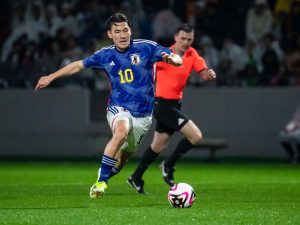
Fujita played the anchor role and built up Japan’s attack / photograph: Masahiro Ura
U-23 Asian Cup review #3: Japan’s lack of decisiveness once again exposed in narrow defeat to South Korea. Hosts Qatar next up in quarter-finals
Although Japan’s progression from the group stage of the U-23 Asian Cup was already confirmed ahead of this match, considering their potential quarter-final opponents victory was still desirable against South Korea.
With a win, Japan would face Indonesia, whereas a loss would pair them with host nation Qatar – an opponent Japan would ideally want to avoid on not only merit but also geographical advantage.
However, in this crucial match, Japan lost 1-0 to their eternal rivals, casting a shadow over their bid to qualify for an eighth consecutive Olympic Games.
This tournament, with matches being played every three days, requires the combined strength of all 23 players, and Japan made seven changes to their starting line-up from the previous game against UAE. Goalkeeper Taishi Brandon Nozawa, defender Riku Handa and midfielder Satoshi Tanaka all made their first starts, as did Kotaro Uchino, the only university student in the squad. This means that 22 of Japan’s 23 players, with the exception of third-choice goalkeeper Taiki Yamada, have all been given opportunities to play so far.
South Korea also made 10 changes from their previous game and set up with a five-man defence, a surprising tactical approach considering they were favourites to win the game.
Japan attacked down the left flank with Yu Hirakawa from the outset, but they were unable to produce a decisive opening goal on account of Korea packing their defence with numbers and holding out resolutely.
That pattern continued as the game remained goalless into the second half, with Japan continuing to boss possession but unable to break Korea down.
Oiwa sent on Fujita, Matsuki and Sato to try and make the breakthrough
To break the deadlock, Japan coach Go Oiwa made three changes in the 63rd minute, bringing on captain Joel Chima Fujita, Kuryu Matsuki, who had shone in the first match against China, and No.10 Kein Sato.
Matsuki almost made an immediate impact when he pounced on a cross from the right just one minute later, and in the 71st minute Kotaro Uchino came close to scoring after a through ball by Matsuki, who had shown great persistence in midfield.
However, despite creating good chances, the first goal did not fall on Japan’s way. Instead, in the 75th minute, Kim Min Woo headed home from a tight angle after a corner to give Korea the lead.
After falling behind, Japan introduced Rihito Yamamoto and Mao Hosoya, and in the 82nd minute Hosoya and Sato had a series of decisive chances. Fujita then followed up with a sharp strike from the edge of the area, and in the nine minutes of added time Hosoya and Sato again both had opportunities to equalise with headers.
However, none of these efforts found the net and the whistle sounded with the score at 1-0.
Japan dominated possession throughout the match, with over 60% of the ball and 15 shots on target, far more than Korea, who had just six. Despite this, Japan’s inability to turn their superiority into goals has been a major problem for them at this tournament.
They scored early against China but weren’t helped on account of having a player sent off soon afterwards, and even against UAE, a game in which they scored twice, Japan missed a number of good chances. Against Korea, too, they created many opportunities but failed to capitalise upon them.
The worrying thing is that Hosoya and Sato, who have been the team’s main scorers, are yet to register. The performances of these two players, who have both missed decisive openings in consecutive matches, highlight Japan’s current state of affairs in front of goal.
Japan will now face Qatar in the quarter-finals. In the knockout stage, it is all the more important that teams make sure they convert their limited chances. Japan have a stable defence and have only conceded one goal in three matches, but now it’s imperative that their ace striker and No.10 get back on track at the other end of the pitch.


